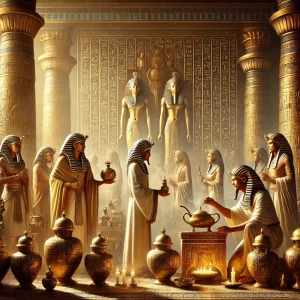
The Origins of Essential Oils: A Journey Through Time
Essential oils have been treasured for their powerful properties and rich aromas for thousands of years. Their journey through history reveals how deeply intertwined they are with the spiritual, medicinal, and cultural practices of various civilizations. From ancient Egypt to modern holistic wellness, the story of essential oils is one of both tradition and transformation.
Ancient Beginnings
The roots of essential oils trace back to ancient civilizations where plants and their extracts were regarded as sacred gifts from the earth. The first recorded use of aromatic oils dates back over 5,000 years to ancient Egypt. The Egyptians used oils not only for perfumery and cosmetics but also for spiritual and medicinal purposes. Oils like frankincense and myrrh were integral to religious rituals and embalming processes, symbolizing purification and immortality.
In ancient India, essential oils were deeply integrated into the Ayurvedic system of healing. Plant extracts such as sandalwood, jasmine, and turmeric were used for balancing the mind, body, and spirit—a tradition that continues to influence modern aromatherapy practices.
The Influence of Greek and Roman Cultures
The knowledge of essential oils spread to Greece, where they were revered for their therapeutic properties. Hippocrates, known as the “Father of Medicine,” emphasized the benefits of aromatic baths and massages with herbal oils for health and vitality.
The Romans, inheriting much from Greek traditions, elevated the use of essential oils, incorporating them into daily life. Roman baths often included fragrant oils to cleanse the body and uplift the spirit. Oils like lavender and rosemary were particularly popular for their calming and rejuvenating effects.
The Role of the Middle East
The Middle East played a significant role in refining the extraction and distillation of essential oils. Around the 10th century, the Persian scholar Avicenna developed advanced distillation techniques to extract oils more effectively, paving the way for modern methods. Rose oil, a product of this innovation, became a symbol of luxury and healing.
Essential oils also featured prominently in traditional Islamic medicine. Texts from this period highlight the use of oils such as camphor, clove, and rose for both spiritual and physical well-being.
Medieval Europe
During the Middle Ages, essential oils gained prominence in Europe, primarily through trade and the Crusades. Herbalists and alchemists of the time experimented with distillation techniques, creating tinctures and infusions for medicinal purposes. Oils like thyme, peppermint, and eucalyptus were valued for their antimicrobial properties, especially during outbreaks of disease.
The Renaissance and Beyond
The Renaissance brought a renewed interest in the natural sciences and holistic health. Essential oils were embraced not only for healing but also for artistic and personal expression through perfumery. By the 17th and 18th centuries, the study of botany flourished, and essential oils became a staple in both European apothecaries and homes.
Modern-Day Aromatherapy
The term “aromatherapy” was coined in the early 20th century by French chemist René-Maurice Gattefossé, who discovered lavender oil’s remarkable ability to heal burns. This event sparked renewed interest in the therapeutic applications of essential oils. Today, essential oils are a cornerstone of holistic wellness practices, offering benefits ranging from relaxation and stress relief to immune support and energy enhancement.
A Timeless Gift
The origins of essential oils remind us of the profound connection between humanity and nature. Over millennia, they have evolved from sacred rituals to everyday wellness essentials, yet their essence remains the same: a pure, potent gift from the earth.
Whether through meditation, skincare, or healing practices, essential oils continue to bridge ancient traditions with modern needs, offering a timeless path to balance and vitality.